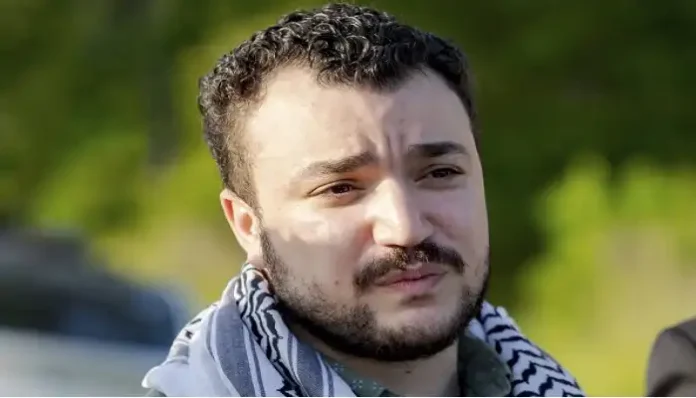NEW YORK — In a gripping tale of resilience and resistance, Mahmoud Khalil, a Palestinian activist and green card holder, endured over 100 days in U.S. Immigration and Customs Enforcement (ICE) detention without charges, facing the looming threat of deportation.
In an emotional interview with CNN’s Christiane Amanpour, Khalil, now reunited with his wife and newborn son, shared the harrowing details of his detention, his unyielding spirit, and the profound pain of missing his child’s birth.
His story, marked by dehumanizing conditions and an administration’s attempt to silence his advocacy, is a testament to the power of perseverance in the face of injustice.
A “Kidnapping” in Plain Sight
Khalil’s ordeal began in March outside his apartment on Columbia University’s campus in New York City. Returning from dinner with his wife, he was ambushed by plainclothes ICE agents who, he says, followed him into his building’s lobby and threatened to arrest his pregnant wife if she didn’t step away.
“It felt like a kidnap,” Khalil told Amanpour, noting that the agents lacked a warrant—a detail CNN previously reported. The arrest, sudden and aggressive, marked the beginning of a grueling journey through the U.S. immigration system.
Khalil, a 30-year-old who was born in a Syrian refugee camp and later graduated from Columbia, had been a prominent figure in pro-Palestinian protests on campus, advocating against Israel’s war in Gaza.
His activism made him a target in what he and his supporters describe as a broader crackdown on pro-Palestinian voices under the Trump administration’s campaign against alleged antisemitism on college campuses.
Please to also read Trump Allies Linked to Website Doxxing Pro-Palestine Academics, Pushing Deportation
A Journey Through Detention
Shackled and treated “like an object,” Khalil was shuffled across three states—New Jersey, Texas, and finally Louisiana, over 1,000 miles from his wife, who was eight months pregnant at the time.
The conditions in the Louisiana ICE facility, operated by the GEO Group, were nothing short of dehumanizing. Khalil described “inedible” food that once made him vomit, forcing him to switch to vegetarian meals.
The facility was frigid, with requests for blankets ignored. “The moment you enter such ICE facilities, your rights literally stay outside,” he told Amanpour.
Despite the brutal conditions, Khalil’s spirit remained unbroken. “From the moment I was detained, I knew that I would eventually prevail,” he said, his voice steady with conviction.
“What I simply did is protesting a genocide.” Israel has consistently denied allegations of genocide in its Gaza operations, but Khalil’s protests struck a nerve, drawing both support and ire.
A Father’s Heartbreak
Perhaps the most gut-wrenching moment of Khalil’s detention was being denied the chance to witness his son’s birth. ICE officials cited a “blanket no-contact visitation policy” and vague security concerns, rejecting multiple requests for Khalil to be present.
“Missing the birth of my child was the most difficult moment in my life,” he said, his voice heavy with emotion. The first time he saw his newborn was through thick glass, unable to hold him.
It wasn’t until a court order granted him a single hour with his son that he could finally cradle him in his arms. “I don’t think I would be able to forgive them for taking that moment away from me,” he added.
A Fight for Justice
Khalil’s detention sparked nationwide outrage, with protests in New York and Seattle demanding his release. His legal team has now filed a $20 million claim against the Trump administration, alleging false imprisonment and accusing the government of portraying him as antisemitic to justify their actions.
The Department of Homeland Security called the claim “absurd,” while the administration previously accused Khalil—without evidence—of being a Hamas sympathizer. They also argued he failed to disclose ties to two organizations in his green card application, a claim his lawyers dismiss as flimsy.
“They want to conflate any speech for the rights of Palestinians with speech that’s supporting terrorism, which is totally wrong,” Khalil told Amanpour. He sees his detention as a deliberate attempt to make an example of him, a warning to others who dare to speak out. Yet, Khalil remains undeterred.
If his lawsuit succeeds, he plans to share any settlement with others targeted in what he calls the administration’s “failed” effort to suppress pro-Palestinian voices. Alternatively, he would accept an official apology and reforms to deportation policies.
A Symbol of Resilience
Khalil’s story is more than a personal struggle—it’s a powerful symbol of resistance against systemic injustice. His journey from a Syrian refugee camp to Columbia’s halls and through the cold confines of ICE detention reflects a life defined by defiance and hope.
“It’s a message,” he said of his ordeal, “that they will find a way to punish you if you speak against what they want.” Yet, Khalil’s unwavering belief in his cause and his refusal to be silenced prove that even in the darkest moments, the human spirit can prevail.
As he holds his son today, reunited with his family, Mahmoud Khalil stands as a beacon for those fighting for justice, reminding the world that no cell, no shackles, and no policy can extinguish the fire of conviction.



![Polls Reveal Cracks in Trump’s Second-Term Presidency US President Donald Trump arrives on the South Lawn of the White House in Washington, DC on July 29, 2025 [Jim Watson/AFP]](https://liputankhusus.com/wp-content/uploads/2025/08/US-President-Donald-Trump-arrives-on-the-South-Lawn-of-the-White-100x70.webp)







